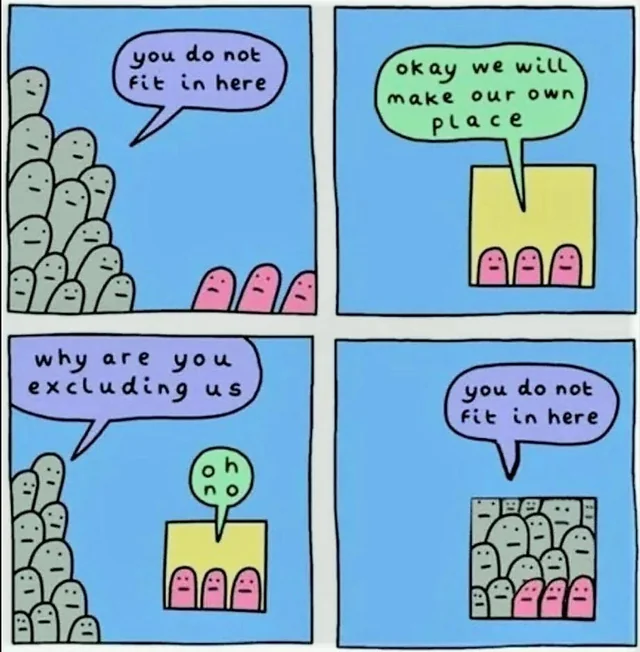We live in a time of crisis. Climate, community, communication, all are breaking down. Our tools and platforms no longer serve us. To make sense of this, we need to tell stories. And in the digital world, hashtags are one of the most powerful ways we do this. But our hashtags don’t just tag, they trace the roots of our problems, and signpost paths out. Each one is a seed. Together, they are a map.
#dotcons – From #openweb to walled gardens. Once, the internet was a place of openness, built on free tools, shared protocols, and community spirit. Then came the #dotcom era, where profit became the driving force. Platforms like Facebook, Google, and Amazon, what we call the #dotcons, reshaped the web to lock us in and sell us out. A handful of corporations own the highways of our communication, and their algorithms guide what we see, say, and believe.
#dotcon = profit for a few, con for the rest.#stupidindividualism – A trap we set for ourselves, we were promised empowerment. But what we got was individualism without solidarity. We’re told: brand yourself, hustle alone, curate your reality. But without community, there is no resilience. Without cooperation, there is no change.
#stupidindividualism is the cultural poison that tells you “you’re on your own.” It weakens us from the inside.#deathcult – Forty years of neoliberalism. The last four decades have been shaped by a ruthless ideology, that markets solve everything, government should step back, and people must compete, not care. This is the #deathcult – a term for the deadly logic of late-stage capitalism. It’s taken over politics, media, even our sense of self.
Climate denial, gig work precarity, housing crises, mental health collapse - these are all symptoms.#geekproblem – The failure of trust in tech. Even our allies, the people building tech to fix things, fall into a trap. The #geekproblem is when developers replace trust with control, more permissions, more encryption, more complexity. Instead of building with people, they build over them. The result? More unusable tools, more silos, more #techshit that ends up needing to be composted in abandoned GitHub repos.
#4opens is a way out of the mess, we need this new paths, based on simplicity, humility, and openness, a compass. If a project doesn’t pass the #4opens, it’s not building for the commons, it’s just making another silo.
#OMN, shovels and compost, we already have the tools, projects that build media flows, not platforms. To connect blogs and podcasts into open rivers of content, using simple tech instead of complicated “Web3” vaporware or #dotcons mess.
We’ve built up piles of #techshit. It’s time to pick up our #shovels, compost the waste, and grow something new.Hashtags = Soft tools for hard times. We use soft metaphors because we live in soft systems: culture, emotion, trust. You can’t “solve” these with code alone. You need care, community, and storytelling. Yes, many demand hard, scientific “proofs” or “frameworks.” But if someone can’t feel the metaphor, they’re probably not ready for the work of rebuilding. We need to focus on those who can, who’ve seen that a different world is possible.
If you can understand that different ideologies shape different realities, then these hashtags will start to speak to you.Let’s recap the key tags in the story:
#dotcons – Corporations that own and fence in our web
#failbook – Facebook and its culture of manipulation
#openweb – The decentralized, people-powered internet
#4opens – A compass for ethical, sustainable tech
#geekproblem – Tech that controls instead of empowers
#stupidindividualism – Isolation sold as freedom
#deathcult – Forty years of neoliberalism and its collapse
#OMN – Building networks, not silos
#techshit – All the unusable tools that ignore real needs
#shovels – The work we must do
#compost – Making good soil from past mistakesWe don’t need heroes, we need gardeners, grab a shovel, let’s build a future please.






